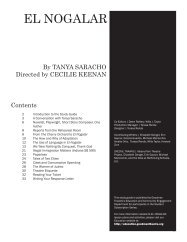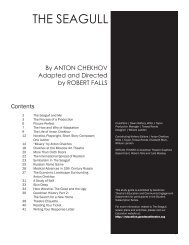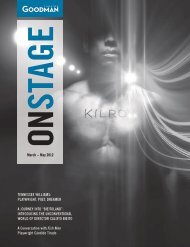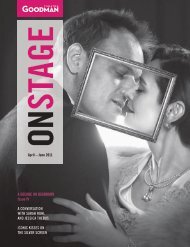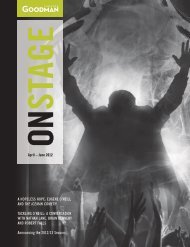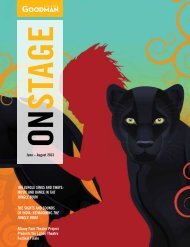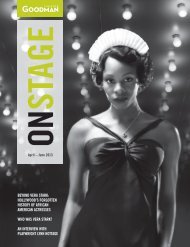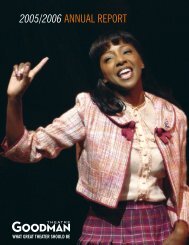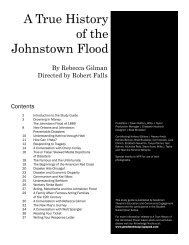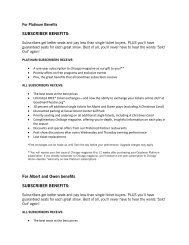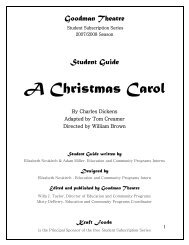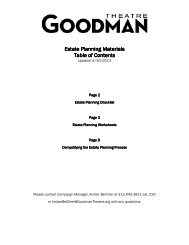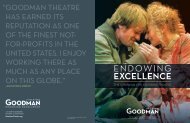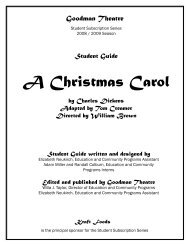You also want an ePaper? Increase the reach of your titles
YUMPU automatically turns print PDFs into web optimized ePapers that Google loves.
IN THE OWEN<br />
A Conversation<br />
with Christopher Shinn<br />
Known for his incisive, closely observed<br />
explorations of characters grappling with<br />
events beyond their control, Pulitzer<br />
Prize finalist Christopher Shinn was<br />
inspired to write Teddy Ferrara in the<br />
wake of a number of well-publicized<br />
incidents of bullying of lesbian, gay,<br />
bisexual, transgender and questioning<br />
(LGBTQ) youth, including the tragic<br />
case of Rutgers University student<br />
Tyler Clementi. Commissioned by the<br />
<strong>Goodman</strong> and developed in our annual<br />
New Stages series, Teddy Ferrara<br />
explores the contemporary climate for<br />
LGBTQ youth in universities, asking difficult<br />
questions about victimization and<br />
responsibility, and delving into what<br />
it means to come of age in an era dominated<br />
by social media. In a conversation<br />
with Tanya Palmer, the <strong>Goodman</strong>’s director<br />
of new play development, Shinn<br />
discusses his inspiration and his relationship<br />
to the world of the play.<br />
Tanya Palmer: What inspired you to<br />
write Teddy Ferrara?<br />
Christopher Shinn: In 2010 there was<br />
a string of suicides of gay youth, many<br />
of which seemed linked to bullying. And<br />
for some reason there was more public<br />
attention paid in this period than there<br />
had been previously to these issues. It<br />
is something I’ve wanted to write about<br />
for a very long time. After Matthew<br />
Shepard was killed, I remember I saw<br />
The Laramie Project and thought, wow,<br />
the one thing this play doesn’t dramatize<br />
is the person who was killed. That<br />
was what interested me the most. Ever<br />
since then I wondered when, if ever,<br />
I would write that play—a play that<br />
explores the issues that interested me<br />
back then. And when these issues were<br />
in the news in 2010, those feelings and<br />
thoughts got restimulated in me and it<br />
felt like a really ideal time to explore<br />
in-depth the dynamics behind bullying<br />
and suicide.<br />
TP: I know from our conversations that<br />
some of the characters in the play are<br />
drawn from your memories of your<br />
own college days, but the piece is also<br />
very grounded in college today and the<br />
particular way in which social media<br />
impacts students in that age group.<br />
Could you talk about the similarities<br />
and differences?<br />
Synopsis<br />
Teddy Ferrara introduces us to Gabe, a college senior and the president of his campus’<br />
Queer Students Group. Gabe has a great new boyfriend, fun friends and aspirations<br />
to start a career in politics when he graduates. But when a campus tragedy<br />
occurs, Gabe finds himself inadvertently pulled into the center of a tense debate<br />
that threatens to tear down everything he’s worked to build up.<br />
ABOVE: Playwright Christopher Shinn.<br />
CS: I’ve always wanted to paint a really<br />
complete portrait of the characters that I<br />
was writing about. I didn’t want to write<br />
a play about an issue—I wanted to write<br />
a play about complex human beings<br />
moving through the world. And my task<br />
and my challenge was to make it really<br />
convincing. I couldn’t just write about<br />
myself and transpose it; it really is a different<br />
world today. I remember the first<br />
time we signed onto America Online in<br />
1993—I was 18 years old. Kids today<br />
grow up with extraordinary technology<br />
from the time they are very young, and<br />
it is an entirely different social world as<br />
mediated through media and technology.<br />
An extraordinary coincidence was that I<br />
had an opportunity to teach undergraduates<br />
at The New School just as I was<br />
beginning to work on the play. I usually<br />
teach graduate students, but now I was<br />
working with students who were 18,<br />
19, 20 years old, and I was watching<br />
them—watching how they interacted<br />
with each other, how they interacted<br />
with their mobile devices, how they paid<br />
attention, how they didn’t pay attention.<br />
So as I was digging into my memories<br />
of being that age, I was able to measure<br />
my experience and my memories of my<br />
feelings against what I was experiencing<br />
in this intimate classroom setting with<br />
undergraduates. So that became the<br />
tension that drove the play in an exciting<br />
way for me.<br />
TP: Beyond the young characters who<br />
are central to the play, you’re also looking<br />
at the university—the faculty and<br />
administration who are trying to deal<br />
with LGBTQ issues. What interested<br />
9



